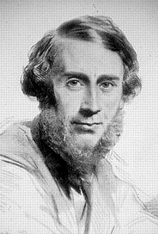August 2: John Tyndall
John Tyndall (1820)
It was on this date, August 2, 1820, that British physicist John Tyndall was born in County Carlow, Ireland, to English Protestant parents. Tyndall left school at the age of 17, with a grounding in basic mathematics and worked for a time as a surveyor in the Irish Civil Service. Higher education eluded him until he was in his 30s. Transferred to England, by 1847 he was teaching mathematics at Queenwood College, Hampshire.
Tyndall married late in life, at age 56, and by all reports happily. By then he had become a well-known writer and lecturer on, and popularizer of, science, as well as an ardent defender of the theory of evolution. Among his friends were Scottish historian Thomas Carlyle, the poet Tennyson, English chemist and physicist Michael Faraday (about whom Tyndall published a biography called Faraday as a Discoverer in 1868), and French chemist Louis Pasteur (whose germ theory of disease Tyndall defended). As a science advocate, in 1873 Tyndall gave a profitable lecture tour in the United States — and gave the whole of the proceeds back for science education.
From his youth Tyndall had been interested in religion, and by the time he met and became friends with zoologist and Darwinist Thomas Henry Huxley, he was already a Rationalist. It was not surprising that his views were combined with a vigorous defense of evolution when he addressed the annual meeting of the British Association for the Advancement of Science in 1874. He was president of the Association at the time, and in his "Belfast Address," Tyndall said,
[W]ere a capricious God at the circumference of every wheel and at the end of every lever, the action of the machine would be incalculable by the methods of science. ... All we hear, and see, and touch, and taste, and smell, are, it would be urged, mere variations of our own condition, beyond which, even to the extent of a hair's breadth, we cannot go. That anything answering to our impressions exists outside of ourselves is not a fact, but an inference, to which all validity would be denied by an idealist like Berkeley, or by a sceptic like Hume.*
His unabashed materialism precipitated polemics from pulpits across Ireland. "Every pulpit in Belfast thundered of me," Tyndall told a friend.** Elsewhere, Tyndall said, "Men of science claim, and ... shall wrest from theology, the entire domain of cosmological theory. All schemes and systems which infringe upon the domain of science must, in so far as they do this, submit to its control, and relinquish all thought of controlling it" (1876).
Like his friend Huxley, Tyndall was denounced as an Atheist and a Materialist. He was neither, and he had some respect for the moral elements of Christianity, even if he discounted the Christian story and despised the social record of Roman Catholicism. "Let us beware, then," said Tyndall, "of not considering religion noble; but let us beware still more of considering it true."† Tyndall was an Agnostic and left unanswered the question of "the mystery in which we dwell." He was 73 when he died of an accidental chemical poisoning on 4 December 1893. John Tyndall once said, "The feeling which prompts prayer ... I should like to see guided, not extinguished — devoted to practicable objects instead of wasted upon air."‡
* "Address Delivered Before the British Association Assembled at Belfast" or "Belfast Address," delivered before the annual meeting of the British Association for the Advancement of Science, 1874.
** David N Livingstone (1992), "Darwinism and Calvinism: The Belfast-Princeton Connection," Isis 83, p. 410.
† W.H. Mallock, The New Republic, Bainesville, Fla., 1877.
‡ Fragments of Science for Unscientific People, 1871.
Originally published August 2003 by Ronald Bruce Meyer.


